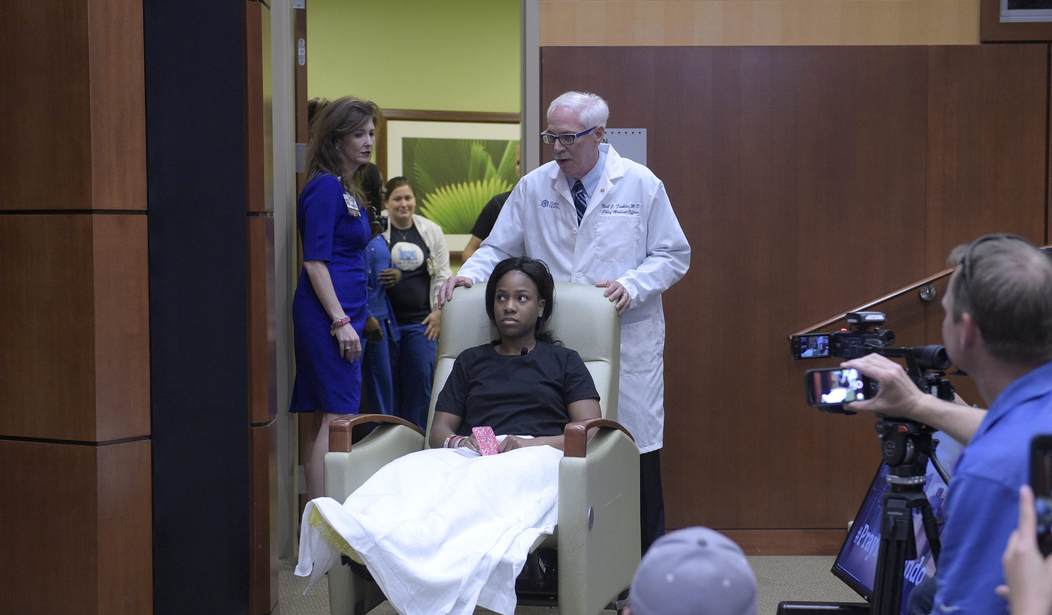WASHINGTON – When Patience Carter was a child, Philadelphia police arrested her father and took him away. It was a negative experience that framed her outlook of law enforcement from a young age.
As an African-American, that outlook, no doubt, has only been further unsettled by the stories, images and videos splashed across social media in recent years documenting the deaths of black people at the hands of police officers. Stories from Ferguson, Baltimore, Staten Island and Cleveland, and countless others, come to mind.
But in June 2016, about 15 years after her father’s arrest, Carter had another significant run-in with police. She was visiting Orlando with a friend and found herself in the Pulse nightclub on the night that a terrorist gunman opened fire, killing 49 people and injuring 53 others, including Carter, who was 20 at the time.
“My situation really confused me a lot,” Carter recalled during a panel discussion Wednesday on Capitol Hill. “Being in the nightclub, being held hostage by this terrorist, extremist person for three hours and then finally having police officers bust through the wall and basically save your life, it changes your whole dynamic and how you feel about the police. Because honestly we could point fingers all day long, but honestly at the same time you have to think about the human beings that are putting themselves in these situations that are dangerous. It made me rethink my biases about the police.”
For Carter, the fractured relationship between police and the African-American communities they serve is an issue of trust.
“I feel like the police don’t trust the communities that they’re protecting, and I feel like the police don’t trust the people that they’re supposed to be protecting, and if we can figure out a way to build this trust between the police and the community, I think we’ll have a better dynamic going forward,” Carter said.
Symone Sanders, another young black woman who appeared on the panel, agreed that community partnerships are important, but she said America needs to address this hostility between the two sides, the “ugly” aspects of the conversation. Sanders, who served as national press secretary for Sen. Bernie Sanders’ (I-Vt.) presidential campaign, said that she would love for police to hold moderated discussions with activists in communities like Ferguson and Baltimore.
“Some young people are literally scared of the police,” Sanders said. “Whether it is a valid feeling or not, and you can’t tell me their feelings aren’t valid, but some folks are literally scared of the police. They’ve only seen officers in negative capacities in their communities, and it’s reinforced when we’re inundated with videos and photos of black people losing their lives at the hands of police officers.”
Sanders discussed the situation in which cities and counties might be populated by 50, 60, 70 percent African-American and Latino residents, while the police force is predominantly white. Communities like Ferguson and Baltimore, she said, are not receptive to police officers.
“I really think it’s important that we talk about hiring and recruiting officers that look like the communities that they serve,” she said. “We cannot underestimate that representation really does matter here.”
Scott G. Erickson, a former police officer in California, agreed with Sanders that agencies should more aggressively recruit people that represent the community. But he asked how police can reconcile that with the fact that recruiting and retention is at a generational low. Philadelphia, for example, is at a 22-year low in staffing, he said.
“How do we get over the fact that nobody right now really wants to be a police officer?” Erickson asked, adding that he believes the trend has a lot to do with modern hostility toward law enforcement perpetuated by social media.
Erickson is the founder of the nonprofit Americans in Support of Law Enforcement, which co-hosted Tuesday’s event in observation of National Police Week. Rep. Scott Taylor (R-Va.) also appeared on the panel. Taylor last year introduced House Resolution 285, which would create police and community alliances around the country with the aim of improving communication between the two sides. The resolution ultimately failed in the 114th Congress. Taylor said that the failure is only temporary, noting that the NAACP has signed a letter of support for the resolution this session.
The congressman said he’s optimistic that the resolution will pass and “put an emphasis on community policing and bridging the gap between the communities and law enforcement, which may have diverging interests and may need to understand each other, the respected constituencies, so I’m happy to bridge that gap and do what I can to help out.”








Join the conversation as a VIP Member